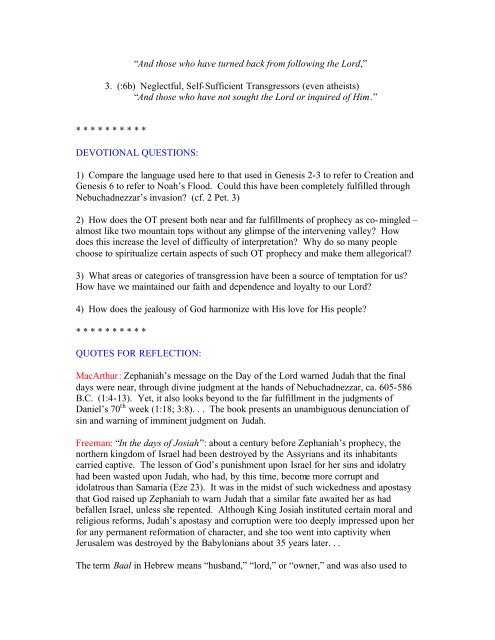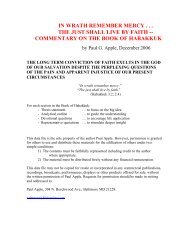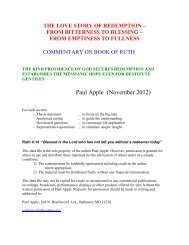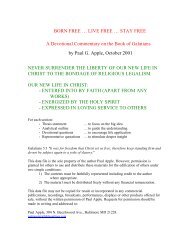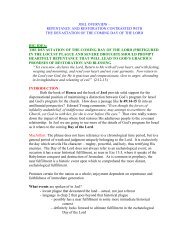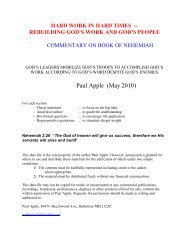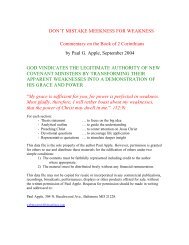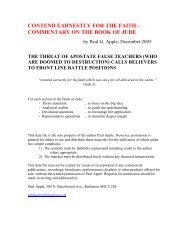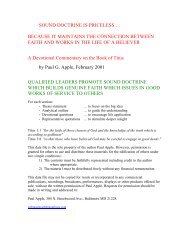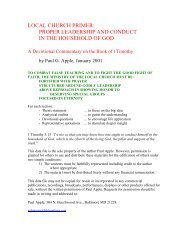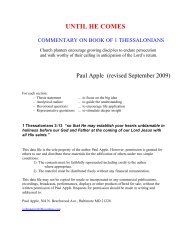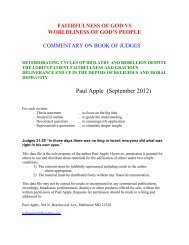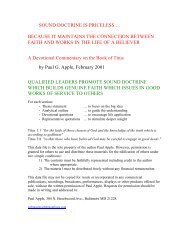“And those who have turned back from following <strong>the</strong> Lord,”3. (:6b) Neglectful, Self-Sufficient Transgressors (even a<strong>the</strong>ists)“And those who have not sought <strong>the</strong> Lord or inquired <strong>of</strong> Him.”* * * * * * * * * *DEVOTIONAL QUESTIONS:1) Compare <strong>the</strong> language used here to that used in Genesis 2-3 to refer to Creation andGenesis 6 to refer to Noah’s Flood. Could this have been completely fulfilled throughNebuchadnezzar’s invasion? (cf. 2 Pet. 3)2) How does <strong>the</strong> OT present both near and far fulfillments <strong>of</strong> prophecy as co-mingled –almost like two mountain tops without any glimpse <strong>of</strong> <strong>the</strong> intervening valley? Howdoes this increase <strong>the</strong> level <strong>of</strong> difficulty <strong>of</strong> interpretation? Why do so many peoplechoose to spiritualize certain aspects <strong>of</strong> such OT prophecy and make <strong>the</strong>m allegorical?3) What areas or categories <strong>of</strong> transgression have been a source <strong>of</strong> temptation for us?How have we maintained our faith and dependence and loyalty to our Lord?4) How does <strong>the</strong> jealousy <strong>of</strong> God harmonize with His love for His people?* * * * * * * * * *QUOTES FOR REFLECTION:MacArthur: Zephaniah’s message on <strong>the</strong> <strong>Day</strong> <strong>of</strong> <strong>the</strong> Lord warned Judah that <strong>the</strong> finaldays were near, through divine judgment at <strong>the</strong> hands <strong>of</strong> Nebuchadnezzar, ca. 605-586B.C. (1:4-13). Yet, it also looks beyond to <strong>the</strong> far fulfillment in <strong>the</strong> judgments <strong>of</strong>Daniel’s 70 th week (1:18; 3:8). . . <strong>The</strong> book presents an unambiguous denunciation <strong>of</strong>sin and warning <strong>of</strong> imminent judgment on Judah.<strong>Free</strong>man: “In <strong>the</strong> days <strong>of</strong> Josiah”: about a century before Zephaniah’s prophecy, <strong>the</strong>nor<strong>the</strong>rn kingdom <strong>of</strong> Israel had been destroyed by <strong>the</strong> Assyrians and its inhabitantscarried captive. <strong>The</strong> lesson <strong>of</strong> God’s punishment upon Israel for her sins and idolatryhad been wasted upon Judah, who had, by this time, become more corrupt andidolatrous than Samaria (Eze 23). It was in <strong>the</strong> midst <strong>of</strong> such wickedness and apostasythat God raised up Zephaniah to warn Judah that a similar fate awaited her as hadbefallen Israel, unless she repented. Although King Josiah instituted certain moral andreligious reforms, Judah’s apostasy and corruption were too deeply impressed upon herfor any permanent reformation <strong>of</strong> character, and she too went into captivity whenJerusalem was destroyed by <strong>the</strong> Babylonians about 35 years later. . .<strong>The</strong> term Baal in Hebrew means “husband,” “lord,” or “owner,” and was also used to
designate <strong>the</strong> god <strong>of</strong> <strong>the</strong> Canaanites, whom <strong>the</strong>y believed controlled nature, fertility, and<strong>the</strong> elements. In <strong>the</strong>ir worship <strong>of</strong> this hea<strong>the</strong>n deity, <strong>the</strong> Canaanites in Palestineindulged in human sacrifice and licentious rites, as well as o<strong>the</strong>r pagan practices. InIsrael’s transition from <strong>the</strong> nomadic shepherd to <strong>the</strong> resident farmer upon her settlementin Palestine, God was aware <strong>of</strong> <strong>the</strong> strong attraction that Baalism, a fertility cult, couldhave upon <strong>the</strong> nation; hence, His uncompromising decree that <strong>the</strong> hea<strong>the</strong>n, toge<strong>the</strong>rwith <strong>the</strong>ir idolatrous worship, were to be destroyed lest Israel herself become corrupted.Morgan: <strong>The</strong>re can be little doubt, I think, that Zephaniah was <strong>of</strong> <strong>the</strong> royal house, and<strong>of</strong> about <strong>the</strong> same age as Josiah, if not a little younger. Probably, <strong>the</strong>refore, he utteredhis prophecy at about <strong>the</strong> age <strong>of</strong> twenty-four or twenty-five, or just when <strong>the</strong>reformation under Josiah was in progress; and yet <strong>the</strong> remarkable thing is thatZephaniah makes no reference to <strong>the</strong> reformation. He speaks only <strong>of</strong> <strong>the</strong> sin <strong>of</strong> <strong>the</strong>people and <strong>the</strong> swift judgment <strong>of</strong> God that is coming upon <strong>the</strong> sin. . . <strong>The</strong> reforms werenot lasting, and consequently Zephaniah, speaking under <strong>the</strong> inspiration <strong>of</strong> <strong>the</strong> Spiritand perfectly understanding that <strong>the</strong> outward appearance <strong>of</strong> reform was not indicative <strong>of</strong>a true change <strong>of</strong> heart toward God took no notice <strong>of</strong> <strong>the</strong> reform; he dealt only with <strong>the</strong>sin and with <strong>the</strong> corruption. He <strong>the</strong>refore more definitely perhaps than any o<strong>the</strong>rprophet declared <strong>the</strong> terrors <strong>of</strong> <strong>the</strong> divine judgment against sin, and <strong>the</strong> larger part <strong>of</strong> hismessage is given to <strong>the</strong> announcement <strong>of</strong> <strong>the</strong> judgment <strong>of</strong> God upon <strong>the</strong> sin <strong>of</strong> His ownpeople.Baker: God’s first words are judgment, initially directed towards all animate creatures(vv. 2-3), and <strong>the</strong>n narrowing down to his own people, Judah, and more specifically <strong>the</strong>inhabitants <strong>of</strong> Jerusalem (vv. 4-6). Not only are those to be punished identified, butalso some <strong>of</strong> <strong>the</strong>ir sins are indicated. Yahweh presents himself as being personallyinvolved in his judgment, which will be devastating in its totality. . .<strong>The</strong>re is in <strong>the</strong>se verses, <strong>the</strong>refore, a range <strong>of</strong> religious response – from <strong>the</strong> desired totalcommitment to Yahweh alone, through a syncretistic mixture <strong>of</strong> Yahwistic and paganworship, to absolute paganism and practical a<strong>the</strong>ism towards Yahweh, who iscompletely abandoned. <strong>The</strong> people were to have kept <strong>the</strong>mselves from all <strong>of</strong> <strong>the</strong>sepaganizing practices and remained a holy people to Yahweh alone, but since <strong>the</strong>y havefailed to do so, God himself will effect <strong>the</strong>ir purification.Boice: [speaking <strong>of</strong> <strong>the</strong> extreme language used in this passage] Does this mean thatZephaniah is not thinking <strong>of</strong> <strong>the</strong> Babylonian invasion? Not necessarily. For one thing,<strong>the</strong> prophet indicates that he is using hyperbole . . . Besides, <strong>the</strong> rest <strong>of</strong> <strong>the</strong> prophecyshows that Zephaniah is actually thinking <strong>of</strong> specific historical judgments upon certainspecific cities and countries, including Jerusalem. This is precisely what occurred.At <strong>the</strong> same time <strong>the</strong> extreme language <strong>of</strong> <strong>the</strong>se opening verses in not without purposein warning <strong>the</strong> Jews <strong>of</strong> his day as well as all subsequent readers <strong>of</strong> <strong>the</strong> book that agreater, final judgment is still pending.Deffinbaugh: <strong>The</strong>se reasons for divine judgment can best be summarized in this way:


